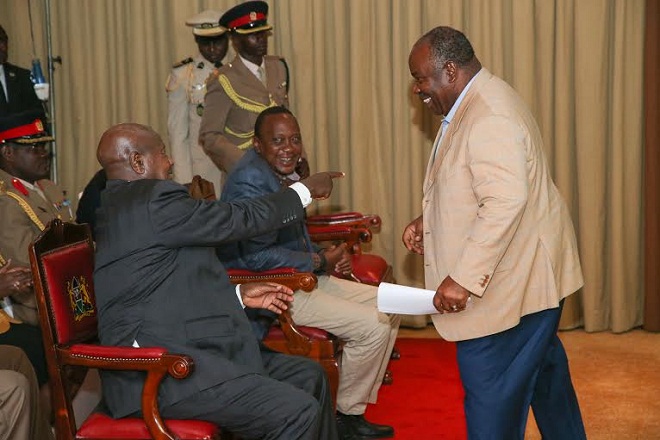To lose our elephants would be to lose a key part of the heritage we hold in trust.We will not allow it #GiantsClub pic.twitter.com/3YwmlgADlF
— Uhuru Kenyatta (@UKenyatta) April 29, 2016
70% of Elephant stock lost
President Uhuru Kenyatta, the host said conservation of the African elephant is no easy matter. The African continent has already lost more than 70 percent of elephant stock to poaching.
“These giants must contend with many threats: illegal killing for ivory and other products; conflict with humans; and loss and fragmentation of habitat. For some elephant populations, the magnitude of these threats is such that many predict they may be lost entirely. But if we act as would be required of us, I am convinced they will not be lost.
Kenyatta said it is important to appreciate the wider dimension of the poaching of elephants and even other wildlife we have in this continent.
“There is convincing evidence poaching is aided by international criminal syndicates; it fuels corruption; it undermines the rule of law and security; it even provides funding for other trans-national crime. This directly threatens the capacity of our nations to achieve sustainable and meaningful socio-economic development.
As part of our commitment to saving elephants, Kenya is a signatory to the Elephant Protection Initiative (EPI). pic.twitter.com/T6J3N9rJdv
— Uhuru Kenyatta (@UKenyatta) April 29, 2016
That is why my Government has declared total war against poaching. But that alone is not enough: we must mobilise friends and partners across the globe to join us in the fight. The Giants Club has already proved itself a key ally in this fight,” he said.
Uhuru said the protection of Giants requires the combined wisdom of our elders and the hope of our youth.
“We have not abandoned our legacy to the whims of the market but, rather, have taken bold steps — giant steps — which merit the praise of our ancestors, and which will inspire our youth to recognize the intrinsic value of our natural heritage. To lose our elephants would be to lose a key part of the heritage we hold in trust. Quite simply: we will not allow it. We will not be the Africans who stood by as we lost our elephants,” he said.

Kenyatta conffirmed Kenya’s commitment to push for the total ban on trade in ivory at the 17thmeeting of the CITES Convention in Johannesburg, South Africa, later this year.
Kenyatta said the move will ensure that Africa’s elephants are protected. CITES is the Convention on International Trade in Endangered Species of wild fauna and flora.
“We will not be the Africans who stood by as we lost our elephants,” President Kenyatta said.
Bongo worried voters say more important than elephants
President Ali Bongo of Gabon said that poaching is not only dangerous to the tourism and wildlife conservation efforts but to the lives of its people and the future generation.
“Illegal gangs look for tasks to finance other activities like drugs and human trafficking. This illicit trade has contributed to insecurity and instability on the African continent,” he said.
Bongo said citizens need to be sensitized on the importance of wildlife and conservation.
“It’s a challenge in my country. My voters say elephants cant be more important than people. In the next elections, they are telling me to go ask elephants to vote for me,” he said.
speaking one day before he is to set fire to Kenya’s nearly entire ivory stockpile.
“Any sale of elephant ivory and rhino horn including within legal domestic markets is inherently likely to increase the risk to our elephant and rhino populations,” he added.
This historic meeting heralds a new beginning not just for Kenya but a number of elephant range States #GiantsClub pic.twitter.com/xl3UB4UYNX
— Uhuru Kenyatta (@UKenyatta) April 29, 2016
‘Iconic totem’
Tomorrow, Kenyatta will set fire to Kenya’s nearly entire ivory stockpile.
The bonfire will be the largest-ever torching of ivory, involving 105 tonnes from thousands of dead elephants, dwarfing by seven times any stockpile burned before. Another 1.35 tonnes of rhino horn will also be burned.
It is a grand statement: on the black market, that quantity of ivory could sell for over $100 million (88 million euros), and the rhino horn could raise as much as $80 million (70 million euros).
Rhino horn can fetch as much as $60,000 per kilo, more than gold or cocaine.
The Convention on International Trade in Endangered Species of Wild Fauna and Flora (CITES) banned the ivory trade in 1989.
Activists say destroying the stocks will help put anti-trafficking efforts at the top of the agenda at the next CITES conference.
China, which has tightened its laws on ivory imports, allows the resale of ivory bought before the 1989 ban, but activists say the trade in legal ivory acts as a cover for illegal imports and call for a complete ban on sales.
*Additional reporting by AFP
 The Independent Uganda: You get the Truth we Pay the Price
The Independent Uganda: You get the Truth we Pay the Price


